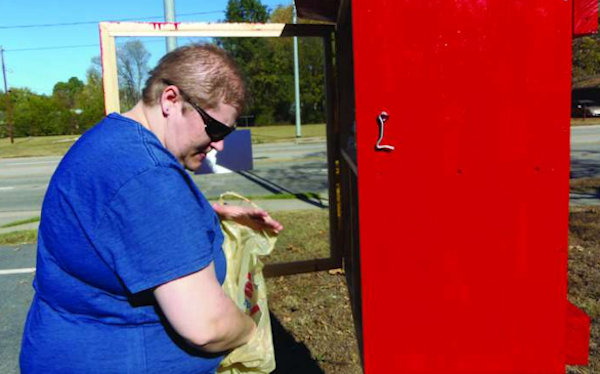These Arkansas congregations provide a mini-shopping experience for neighbors and it’s free!
AMY FORBUS
United Methodists of Arkansas
An idea shared on social media has arrived in Arkansas and is being used by United Methodists to help their communities: the Blessing Box.
The concept is simple: stock a container with nonperishable food items, toiletries or other basic household needs that can withstand storage outdoors. Invite people to take what they need and give what they can. The Blessing Box phenomenon has been compared to the Little Free Library movement, which provides small cabinets of books for communities to borrow and trade. Often, the boxes and the libraries bear some resemblance to each other.
When Patrick Brown, a member of Dover UMC in the Northwest District, saw a post on Facebook that shared the idea of the Blessing Box, he sent it to his pastor, the Rev. Roy Beth Kelley. It turned out that a fellow church member, Cindy Hurley, had sent Kelley the very same photo that day, too.
Quick action, good response
Kelley encouraged the Dover UMC members to run with the idea. Before long, Brown and his wife, Laura, found a small armoire in a thrift store that they thought would work as a Blessing Box. They brought it home and their three teen daughters, Nicole, Kristen and Jennifer, began to sand and paint it, adding lettering on the door as a finishing touch. They delivered it to the church, where Hurley, Kelley and others began stocking it with items.
“It really was a church family effort, because we just got the box ready,” Brown said. “Cindy Hurley and Roy Beth and the other folks at the church took it from there.”
Since then, it has broadened to include nonperishable items donated by the wider community, such as canned goods and snacks left over from a local haunted house fundraiser in October. And the Dover church has found that the stock of their Blessing Box changes regularly, without their constant involvement.
“Our church is right by the Dover Middle School, and right by the football field, so those kids are walking by twice a day,” Brown said. “And there’s a lot of hungry kids in Arkansas.”
It’s not just food, either; there are hygiene products and other non-food items available too—even some children’s books, which tend to go fast, as do packages of diapers.
“It’s just like shopping—people pick the things they like the best!” Kelley says, noting that canned chicken and dumplings seem to be one of the more popular food items.
The Dover congregation also maintains a clothing closet, which was started for families who have connected with the church through their Wednesday after-school program. Some of those families now attend worship and are growing as disciples of Jesus Christ. “People are excited to give and receive,” she said.
Meeting a real need
In Fort Smith, two United Methodist churches have set up Blessing Boxes on their property: Wesley UMC and Kavanaugh UMC, both pastored by the Rev. Dr. Michelle Morris.
Morris says that within the first two weeks of having the Blessing Boxes, people from both churches lost track of how many times the contents were replaced with new items.
“I can generally say that Wesley’s box gets filled and emptied about three times a day…. We have a tremendous amount of foot traffic at Wesley,” she said.
And not all of the food comes from the host churches. It’s an ecumenical, community-wide ministry, with different organizations and churches interested in helping to fill the boxes. Some call to get permission to contribute (which really isn’t needed), and others spot members in the parking lot and ask about it. Still others will post photos on Facebook when they stop by to stock the boxes, which helps spread the word about what’s being offered.
Morris has learned much from watching the activity surrounding the Blessing Boxes. She has seen people trading food, not just giving or taking it.
“My guess is they had either bought something they did not like or had been given something they did not like or couldn’t use, and rather than waste it, they have found a way to give it without looking ungrateful,” she said. “It also makes them partners with us instead of just recipients of charity.”
She also has noticed that much of the giving and taking happens in the evening hours, possibly because people either appreciate the cover of semi-darkness, or they are stopping on their way home from work. And nobody is coming along and taking all of the contents in either location: “People do not appear to be operating out of greed, but instead out of need,” she said.
Filling the gaps
In Dover, Brown thinks the Blessing Box fills a unique and real gap for people who, for whatever reason, come up short at the grocery store but who don’t receive formal assistance.
“I think that there’s people out there that are in need that may not be comfortable walking into a food bank, but this is a way they can get what they need,” he said.
Morris agrees with Brown that the anonymous place to receive food preserves the dignity of individuals who might be hesitant to ask for help. She also believes the two churches she pastors in Fort Smith benefit from hosting the boxes. Having such a consistent, community-based way to help others has contributed to a certain amount of spiritual revival in the congregations. The heavy use of the Blessing Boxes has created excitement. “My folks love coming up and sharing stories with me, and the energy to serve is pretty high right now,” she said.
Brown is thinking about how and where the Dover church might put some smaller blessing boxes that wouldn’t have a need to be under an awning like the one at the church. “Like satellite locations in different places,” he suggests. “But right now, this is a good start.”
Last Updated on December 29, 2022

